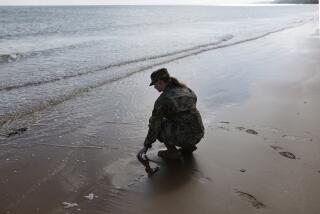Memorial Day Tributes: A Light Still Burns
“As I walked through the cemetery this morning, I saw all the gravestones--Spanish-American War, World War I, World War II,” Thomas McGowan said quietly.
“I thought about some of the friends I’d lost, people who were killed right in front of me. . . .
“If they hadn’t given their lives,” he said, “there might be a lot more people dead today.”
Then McGowan, 68, a retired employee of the city of Los Angeles’ credit union--and former sergeant, Company C, 358th Infantry, 90th Division--stepped forward in the warm, breezy sunshine to accept the Croix de Guerre, a medal presented to him by the government of France for heroism during World War II.
The people gathered in front of the Disabled American Veterans Hall in Woodland Hills said the medal was awarded to McGowan Monday for gallantry during close combat against German troops in the small French town of Magnon and during the Battle of the Bulge.
But McGowan said that wasn’t what Monday’s ceremonies were really all about.
What they were about, he said, was those who never came back.
“I want to do something today,” he said. “I want to dedicate this medal to my fallen comrades.”
The simple ceremony in Woodland Hills was part of the tribute paid across America on Monday to those who died in this nation’s wars. About 800 people gathered at the Los Angeles National Cemetery in Westwood to hear Sen. Pete Wilson (R-Calif.) call for renewed dedication to the causes for which American men and women have laid down their lives.
“We have always wanted peace,” Wilson said. “We have always prized freedom more. . . .
“Today we resolve that our generation, no less than theirs, will do its duty toward achieving a world where no one wields a sword, and no one drags a chain,” Wilson told the audience gathered amid a field of 79,000 fluttering American flags--one on the grave of each of the veterans buried at the cemetery.
“Today we renew ourselves to the cause for which they fought so valiantly,” he said.
In Arlington, Va., Thomas Turnage, head of the Veterans Administration, representing President Reagan, laid a wreath at the Tomb of the Unknowns as a crowd that included government dignitaries, tourists in short pants and a ragged band of motorcycle riders stood respectfully silent under a broiling sun.
“We asked; they answered,” Turnage said. “Always around when we needed them, yesterday’s soldiers, today’s veterans, were and are the steady kind.”
Across the Potomac River in Washington, veterans in combat fatigues greeted each other with bear hugs and searched the black stone memorial engraved with the names of 58,000 American soldiers who died in Vietnam.
“You are among that small, select group of Americans who observe Memorial Day as it was intended,” former Sen. Charles Mathias (R-Md.) told the crowd. “You are keeping faith with the past and with the present.”
In New York City, about 250 veterans threaded their way through sparse, flag-waving crowds for a march up Broadway to the Soldiers and Sailors Monument in Riverside Drive Park.
Reason to March
“I marched in the parade because I felt I wasn’t recognized by the American people,” said Wayne Fraley, a Vietnam combat flier who now lives in a shelter for homeless men in Queens.
“In time of war, we were called elite,” Fraley said. “How did we ever land in the streets?”
Ron Lewis, a sidewalk vendor selling small flags to the spectators along Broadway at $2 apiece, complained that business was slow.
“Half the people don’t know the significance of Memorial Day,” Lewis said. “Memorial Day weekend is just a beach weekend for most people.”
A few miles to the north, near the upstate town of Nanuet, N.Y., Vietnam veterans borrowed a page from this nation’s history to honor the war dead with a string of signal fires atop the mountains overlooking the Hudson Valley.
“The symbolism is the light burning for the patrol that is still out,” said Jerry Donnellan, who was wounded while serving in Vietnam.
Still Face Problems
“We use the fires to remember our dead and for a lot of the guys who haven’t come back, as well as those still facing problems here,” he said.
Donnellan said the fires were inspired by the signal blazes lit by American troops along the Hudson Valley to announce the end of the Revolutionary War.
More to Read
Sign up for Essential California
The most important California stories and recommendations in your inbox every morning.
You may occasionally receive promotional content from the Los Angeles Times.










